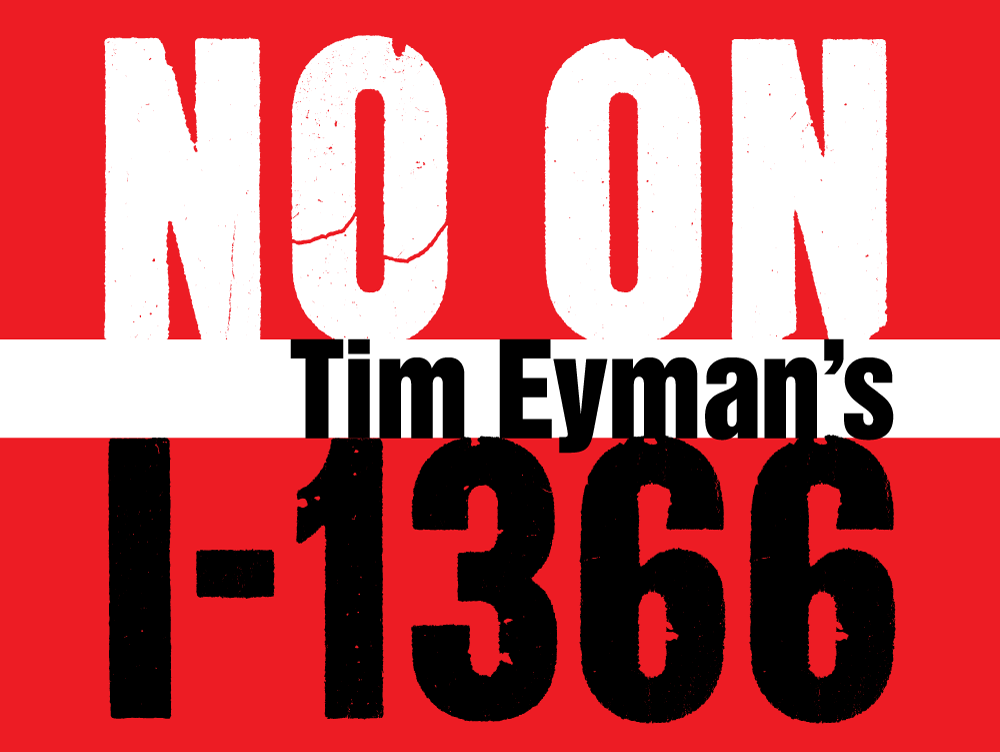Good morning from Olympia! NPI Treasurer Essie Hicks and I are here at the Temple of Justice, the meeting place of the Supreme Court, to listen to oral argument in Lee v. State, the legal challenge to Tim Eyman’s I‑1366. Attorneys representing each of the parties in the case will have an opportunity to summarize their arguments before the nine justices of the Court.
I will post updates throughout the hour as we go along.
UPDATE, 9:10 AM: The first attorney to present is Richard Stephens, who represents Tim Eyman and his associates. Eyman is one of the defendants in the case, but he’s also one of the appellants, because he was on the losing side when the case was decided in King County Superior Court.
Since stepping forward to begin his presentation, Stephens has been peppered with skeptical questions, primarily from Justice Debra Stephens, but also from Justices Mary Yu, Susan Owens, Sheryl Gordon McCloud, and Mary Fairhurst.
The main line of questioning from the justices concerns the defendants’ argument that I‑1366 is simply conditional legislation that is within the scope of the initiative power. Justice Owens asked if an initiative that would roll back the sales tax unless the Supreme Court lifted its McCleary sanctions would be constitutional; while Justice Stephens wanted to know if an initiative that threatened to roll back the sales tax unless the governor resigned would similarly be constitutional.
These are very, very good questions. The justices have clearly done their homework and came prepared to challenge the defendants’ attorneys’ arguments.
UPDATE, 9:20 AM: Callie Castillo is up now, representing the State of Washington. She’s arguing I‑1366 was about “tax reform” (we completely disagree), and therefore the initiative doesn’t violate Article II, Section 19, the single subject rule, which applies to bills and initiatives alike. (The single subject rule was devised by our founders to prevent logrolling — the lumping together of dissimilar policy objectives under one piece of legislation.)
UPDATE, 9:27 AM: Pacifica Law Group’s Paul Lawrence is now speaking for the plaintiffs, who are the respondents in this appeal.
The crux of the case against I‑1366 is that it:
- contains two subjects, in violation of Article II, Section 19;
- runs afoul of Article XXIII because it attempts to invoke the constitutional amendment process, which only the Legislature may do;
- abridges the 2016 Legislature’s plenary powers.
UPDATE, 9:38 AM: The justices have posed some interesting hypotheticals for Paul. Justice Charlie Wiggins, for instance, wanted to know if the Legislature could have constitutionally adopted a measure like I‑1366.
Lawrence immediately answered no. The single-subject rule, he noted, applies to bills as well as initiatives. He also observed that the 2016 Legislature can’t bind a future Legislature. “You can’t restrict their options,” Lawrence said.
UPDATE, 9:46 AM: Paul is doing a splendid job of explaining why the provisions of I‑1366 (the massive sales tax cut and the provision that attempts to dictate a constitutional amendment) aren’t severable.
The Court must therefore strike down the initiative in its entirety.
UPDATE, 9:58 AM: Paul Lawrence has finished his presentation and Callie Castillo is back up for rebuttal (using the balance of her time).
Castillo was interrupted right off the bat when she stated that the people have the same powers as the Legislature. “Wait a minute,” said Justice Gonzalez, pointing out under Article XXIII, only the Legislature has the power to propose constitutional amendments. (The people do not have that power.)
Castillo acknowledged the people don’t have the power to propose amendments, but reemphasized her argument that I‑1366 is a “legislative act”.


Does the AG’s office represent Eyman?
Eyman has his own attorney, Richard Stephens. However, Callie Castillo also represents him since he is (presumably) one of the 760,518 voters who voted for I‑1366. There were 715,684 voters who opposed I‑1366. The voters who voted no on on I‑1366 and who want to see I‑1366 struck down are represented (indirectly) by the plaintiffs in this case and their attorneys at Pacifica Law Group, who are the respondents in this appeal.